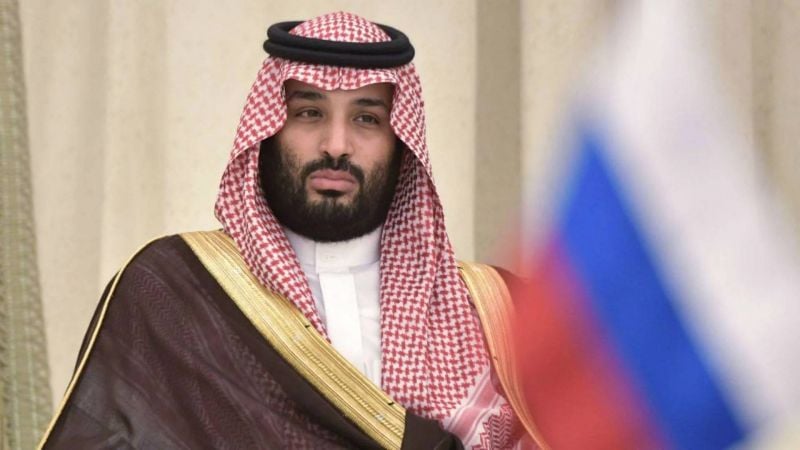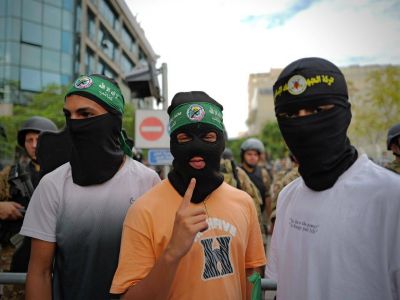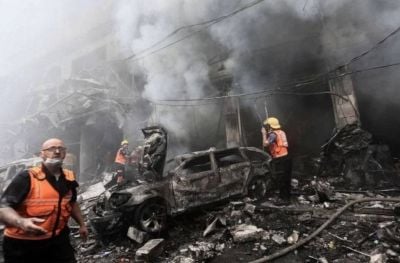
Saudi Crown Prince Mohammed bin Salman. (Credit: AFP File photo)
Saudi Arabia’s approach vis-à-vis the war in the Gaza Strip raises questions given the kingdom’s history of active involvement in regional conflict resolutions.
Earlier this year, the Kingdom hosted peace negotiations for Sudan in Jeddah. Riyadh also played a crucial role in receiving a Houthi delegation to address the regional aspect of the Yemeni war.
Additionally, it was in Riyadh that Syria, led by Bashar al-Assad, was readmitted to the Arab League.
While these initiatives didn’t always yield substantial outcomes, the symbolism of Saudi Arabia’s engagement was evident.
However, in the current Hamas-Israel war, Saudi Arabia appears to be exercising caution, treading carefully on the issue.
Over a month into the conflict, Saudi Arabia is convening its first summits on Gaza, with one scheduled with the Arab League on Saturday and another with the Organization of Islamic Cooperation (OIC) on Sunday.
While these institutions do not sway much influence, they contribute to fostering a sense of Arab and Muslim unity, a role for which the kingdom is considered the guarantor.
This move serves as a necessary reminder for Arab and Muslim audiences of Riyadh’s role, particularly following months of media attention on the Saudi-Israeli normalization process.
“The Saudis want the outside world to recognize that their significance within the Muslim world remains paramount,” said Umar Karim, a researcher at the University of Birmingham specializing in Saudi foreign policy. “They aim to reaffirm their natural leadership role and emphasize that any Saudi-Israeli normalization should not be devoid of political significance.”
Vocal statements
Since the outbreak of the conflict, the Saudi Foreign Ministry has consistently released vehement statements denouncing the actions of “the Israeli occupying forces,” blaming Israel for Hamas’ Oct. 7 attack.
In response to Israeli Heritage Minister Amihai Eliyahu’s unsettling suggestion of a potential nuclear strike on Gaza, the Saudi ministry swiftly issued a statement censuring the “omnipresence of extremism and brutality” within the Israeli government.
“[Crown Prince Mohammed bin Salman] MBS is delicately navigating a balancing act,” said Sami Hamdi, founder of the geopolitical consultancy The International Interest. “He seeks to present a stance that ostensibly supports Palestine and Gaza enough to appease public opinion, all while avoiding alienating Israel and the United States.”
Saudi Arabia finds itself in a dilemma as it aims to avoid estranging Western capitals, especially the US, amid their overt support for Israel.
Despite being temporarily halted, the prospect of normalization with Israel remains a viable option, as indicated by Saudi Investment Minister Khalid al-Falih during the Bloomberg Economic Forum in Singapore on Wednesday.
However, Falih emphasized that normalization is contingent upon “a peaceful resolution of the Palestinian question.”
Furthermore, he outlined additional conditions, including US assistance in developing a civilian nuclear program and security guarantees. These conditions are strategically designed to safeguard Riyadh against potential repercussions from Iran in the event of heightened tensions in the Middle East.
“Mohammad bin Salman knows which battles to fight, and if he takes over Gaza, it will be difficult for him to obtain an American security umbrella,” Karim said. “A security cover is indispensable now.”
This is particularly true because after Hamas’ violent and sophisticated attack on Oct.7, Tehran’s allies in the region, including the Houthis, have been flexing their muscles.
The Houthis carried out multiple missile and drone attacks on Israel last week. Additionally, Bloomberg reported on Oct. 30 that four Saudi servicemen lost their lives in clashes with the rebel group along the Yemeni border.
Vision 2030 is a priority
All this has put the oil monarchy on alert. Its top priority is to implement the Vision 2030 economic diversification program, which requires foreign investment and a stable regional environment.
“For Saudi Arabia, the priority lies in developing relations with Israel and the US to counter Iran,” Hamdi said. “In their eyes, Vision 2030 and the NATO-style agreement against Iran are not worth compromising for the sake of Gaza.”
But for these projects to proceed smoothly, Saudi Arabia must also deal carefully with Iran.
At the beginning of the conflict, MBS conversed with Iranian President Ebrahim Raissi via a phone call — a gesture that was intended to show a degree of convergence with Tehran, but also not to convey a message that upholding the Palestinian cause is not solely limited to Iran.
On Sunday, Raissi is set to make his first trip to Riyadh — a powerful move, which comes almost eight months to the day after the signing of the détente agreement between the two sides in Beijing.
“This suggests that Saudi Arabia is serious about pursuing normalization with Iran and wants to avoid new tension on the Iranian front,” Karim said. “It will also keep the Iranians mum on any condemnation or criticism of MBS and the Saudis on the Palestinian issue, a stance that holds political advantages for Iran.”
Time will reveal whether the Saudi crown prince can sustain this delicate balancing act in such a volatile context.
One certainty is that, through its political discretion, the kingdom is signaling a strong desire to avoid involvement in the war at all costs.
“Ultimately,” Hamdi said, “MBS is hopeful for a resolution that allows this issue to fade away without requiring his country to take any decisive action.”
This article was originally published in French in L'Orient-Le Jour. Translation by Sahar Ghoussoub.


